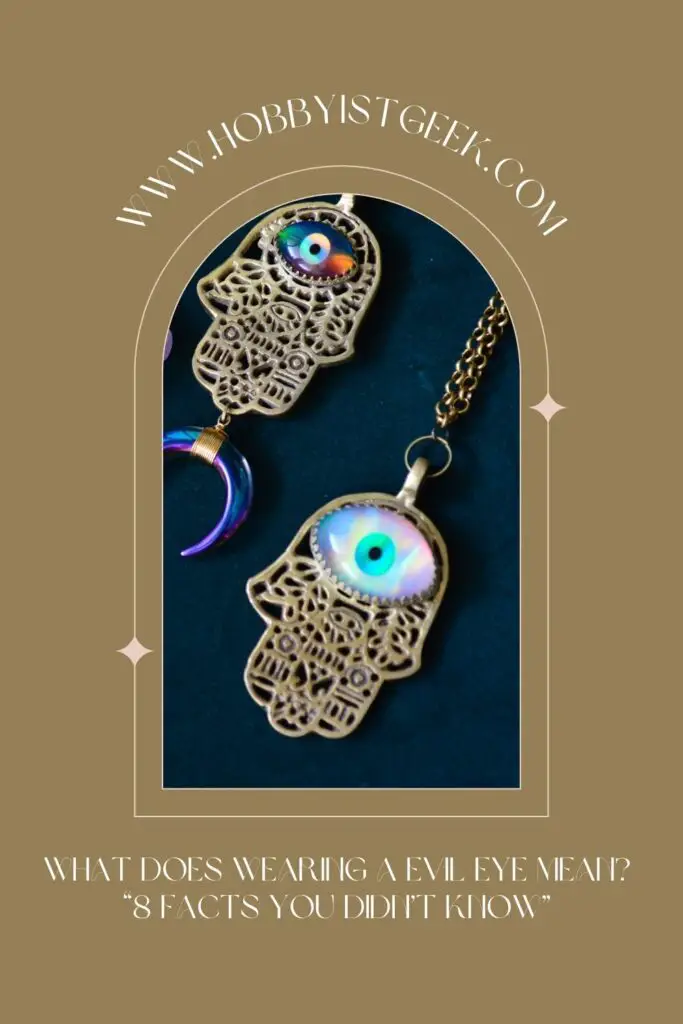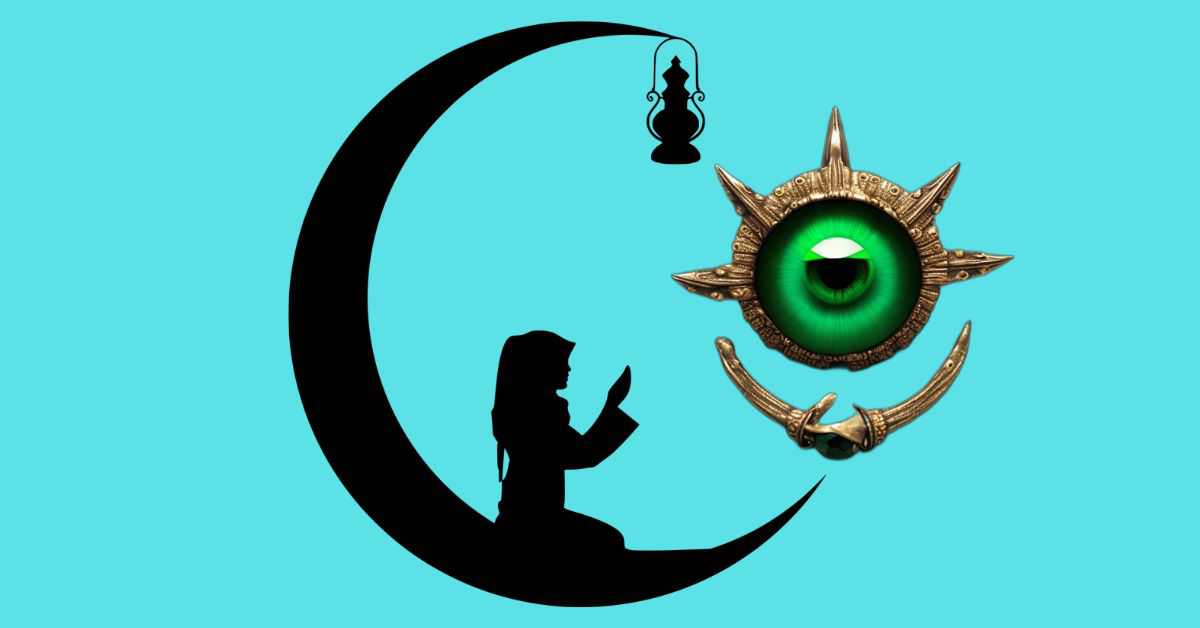Evil Eye Islamic Meaning
Key Takeaway
This article offers a comprehensive understanding of the Islamic meaning of the evil eye, including beliefs, symbolism, remedies, and protection measures, empowering readers with practical knowledge to guard against its potential effects.
Evil Eye Islamic Meaning: Exploring its Islamic Meanings and Mysteries
Evil Eye in Islam
The concept of the evil eye, or nazar, is one that is deeply ingrained in the Islamic faith. The belief is that someone can cast an evil glance or look upon another person, causing harm to them or their possessions.
The Islamic perspective on the evil eye varies widely depending on specific cultural beliefs and practices.
Folklore and Traditions date back hundreds of years and are often rooted in oral traditions passed down through generations.
Stories of people falling ill or experiencing bad luck after being subjected to a malevolent gaze are common.
These tales serve as a warning against envy and jealousy, as it’s believed that those qualities can lead someone to cast an evil eye upon another person.
In some cultures, babies are especially susceptible to the evil eye, so parents might take extra precautions like giving them amulets to protect them from harm.
Understanding the evil eye concept in Islam requires a deep dive into the teachings of the Quran and Hadiths (sayings and actions of Prophet Muhammad).
While there are varying interpretations, it’s generally agreed that envy is at the root of casting an evil eye.
It’s also believed that those who possess powerful abilities like beauty or wealth are more likely to be victims of this harmful gaze.
As such, part of protecting oneself against the evil eye involves being humble and avoiding boastful behavior.
What does the evil eye mean in Islam?
In Islam, the evil eye is believed to be a real and powerful force that can bring harm or misfortune to an individual, especially if they are envied or praised excessively.
It is thought to be caused by jealousy or resentment from others who may not necessarily have good intentions.
The evil eye in Islamic spirituality is seen as a test of faith, and those who remain steadfast in their belief in Allah and seek protection from him can avoid its harmful effects.
The concept of the evil eye in Islam is deeply rooted in the religion’s history and traditions.
It is mentioned in several Hadiths, which are sayings of Prophet Muhammad (peace be upon him), and even mentioned in the Quran.
According to these sources, the Prophet Muhammad used to seek refuge from the evil eye for himself and his family members regularly by reciting specific prayers.
This practice was continued by his companions and has been passed down through generations as a way of warding off any harm caused by the evil eye.
Islamic teachings on the evil eye emphasize that it is not just something that should be dismissed as superstition or folklore.
Rather it should be taken seriously, just like any other form of harm or danger that may come one’s way.
To prevent harm from coming one’s way via this route, there are certain rituals prescribed within Islamic tradition such as seeking refuge with Allah through prayer recitation or using protective amulets designed with Islamic symbols depending on cultural practices observed by different groups within Islam around issues concerning protection against Evil Eye.
What is the evil eye in Islam in Arabic?
The term for the evil eye in Islam is “al-‘ayn” and it is a significant concept in Islamic culture. It is believed that the evil eye can cause harm or misfortune to an individual or object by simply looking at them with envy or admiration.
The evil eye is not limited to any one religion, but it has a significant place in Islamic spirituality and teachings.
In Islamic tradition, the evil eye is believed to be caused by negative energy directed toward someone by another person’s looks.
This negative energy can cause harm and misfortune not only to humans, but also to animals, plants, and objects.
In Arabic culture, there are several beliefs associated with the concept of al-‘ayn such as using amulets or charms to ward off its effects and reciting prayers for protection against it.
Understanding the concept of al-‘ayn is important in order to protect oneself from its consequences and live a healthy life free from any malevolent forces that may be directed toward them.
“In the protection of Allah’s guidance, the evil eye holds no power over those who have faith and seek His blessings.”
Evil eye beliefs in Islam
Belief in the evil eye is deeply ingrained in Islamic culture. People across Muslim-majority countries believe that the evil eye can cause misfortune, accidents, or even death.
There are many superstitions and beliefs surrounding the evil eye in Islam.
Most of these beliefs are tied to envy and jealousy. Muslims believe that if someone becomes envious of another person’s good fortune, their negative energy can cause harm to them.
Islamic perspective on the evil eye sees it as a very real threat to individual and communal wellbeing.
The Hadith literature has many references to the negative effects of jealousy on people’s lives and warns against both casting and receiving the evil eye.
In Islamic thought, the power of envy comes from Satan, who desires to create division among people by making them resentful and hostile toward each other.
Therefore, one must guard themselves against feeling jealous of others’ good fortunes as well as protect themselves from being affected by someone else’s jealousy through prayer, amulets, or other means.

Understanding the evil eye concept in Islam
The evil eye is a powerful and mysterious concept that has been around for centuries, and it is believed to be a curse that can cause harm or misfortune to individuals.
In Islam, the evil eye is known as “al-ayn,” which translates to “the eye.” This refers to the notion that when someone looks at another person out of envy, jealousy, or even admiration, they can cast a spell or curse upon them.
Islamic teachings on the evil eye emphasize its negative effects on people’s lives. The Prophet Muhammad warned his followers of the dangers of the evil eye and instructed them to seek protection from it through prayers and other protective measures.
According to Islamic beliefs, those who are affected by the evil eye may experience physical and mental distress as well as financial difficulties.
Therefore, understanding how to recognize and protect oneself from this curse is essential for leading a healthy and prosperous life in accordance with Islamic teachings.
The symbolism associated with the evil eye in Islamic culture is also significant. Many people wear amulets or talismans designed to ward off its effects as a form of protection against it.
These amulets are often decorated with protective symbols such as Arabic inscriptions or intricate patterns intended for repelling negative energy.
Additionally, various remedies exist within Islamic tradition for treating those who have been affected by this curse.
These remedies typically involve reciting prayers or verses from the Quran, performing ablutions (ritual washing), or using natural remedies such as herbs and oils believed to have healing properties.
Understanding these practices provides insight into how deeply ingrained the concept of the evil eye is within Islamic culture and spirituality.
Evil eye symbolism in Islamic culture
The concept of the evil eye has been prevalent in Islamic culture for centuries, and the symbolism associated with this belief is often seen in various forms throughout Islamic art, literature, and traditions.
The eye, which is considered a symbol of power and protection in many cultures, takes on a different meaning within an Islamic context.
The evil eye symbolizes envy and jealousy that can bring harm to individuals or their property. In Arabic calligraphy, it is common to see protective phrases or prayers written in the shape of an eye to ward off evil.
Evil Eye symbolism is also found in Islamic architecture. You may have noticed small blue glass beads hanging from doorways or windows of homes and businesses throughout the Middle East and North Africa.
These beads are known as “Nazar” or “Nazariya.” They are believed to protect against the malevolent gaze of others by deflecting any harmful energy away from a person or property.
Additionally, some mosques feature elaborate designs with intricate patterns that incorporate the image of an eye as a protective talisman against evil forces or influences.
Islamic teachings on the evil eye emphasize the importance of seeking protection from it through prayer and good deeds.
Muslims are encouraged to say various supplications before leaving their homes to seek Allah’s protection from all types of harm including those caused by envious individuals casting a harmful gaze upon them.
It is also recommended that believers recite Surah al-Fatiha and Ayatul Kursi daily for added protection from all kinds of negative energies.
While there may be variations in how people understand and practice protecting themselves against the evil eye across different regions within Islam – one thing remains consistent: Believers turn towards their faith for guidance on how best to protect themselves from negative energies like envy which can lead to consequences that disrupt their well-being physically, emotionally, mentally even spiritually if not dealt with properly through Islamic means such as prayer and good deeds.
“The evil eye reminds us to appreciate the beauty and blessings bestowed upon us, for envy can only thrive where gratitude is absent.”
Evil eye superstitions in Islam
Evil eye superstitions have been part of Islamic culture for centuries. These superstitions are centered around the belief that someone who has an evil eye can cause harm to others, either intentionally or unintentionally.
Some people believe that the evil eye can cause illness, injury, or even death in extreme cases.
There are many different types of evil eye superstitions in Islam, and they vary depending on the region and culture.
For example, some people believe that you can ward off the evil eye by carrying an amulet with you at all times.
Others believe that reciting certain Islamic prayers for protection against the evil eye can help keep you safe from harm.
Still, others believe in using specific remedies or protective measures to ward off the effects of the evil eye.
Despite these beliefs surrounding the evil eye in Islam, it is important to remember that not all Muslims subscribe to these superstitions.
In fact, some Islamic scholars argue that these beliefs have no basis in Quranic teachings and should not be given credence.
Nevertheless, many Muslims continue to hold onto these traditions as a way of protecting themselves and their loved ones from harm.
This is an important article What is Islam’s take on the “evil eye” and superstition?
The history and origins of the belief in the evil eye in Islamic culture
The belief in the evil eye has been present in Islamic culture for centuries. It is thought to have originated from pre-Islamic times when people believed that some individuals had the power to cast a spell over others by simply looking at them.
The concept of the evil eye was assimilated into Islamic teachings, and it remains an important part of Islamic folklore and traditions to this day.
According to Islamic teachings on the evil eye, it is believed that envy and jealousy can cause harm to others.
This harm can manifest in different ways, such as illness or misfortune.
Evil Eye in Islamic Folklore and Traditions speak of stories where people have suffered from the effects of the evil eye, such as experiencing unexplained illnesses or accidents.
As a result, many Muslims believe that it is important to take protective measures against the evil eye, whether through prayers or wearing amulets.
Evil Eye beliefs in Islam vary depending on different regions and cultures.
In some places, it is believed that only certain individuals have the power to cast an evil eye spell over others, while other regions believe that anyone can do harm with their gaze if they are jealous or envious enough.
However, no matter what form these beliefs take on across different cultures and regions within Islam, one thing remains constant – protection against the evil eye is a crucial aspect of Muslim life.
Pros and Cons of Evil Eye Islamic Meaning
| Stories or examples from Islamic history and folklore related to the evil eye | Cultural richness and storytelling | Historical accuracy may be uncertain |
| Evil eye consequences in Islam | Awareness of potential negative effects | Fear or excessive preoccupation |
| Evil eye remedies in Islam | Knowledge of protective measures | Dependence on rituals without true efficacy |
| Islamic prayers for protection against the evil eye | Spiritual guidance and supplication | Different understandings of their efficacy |
| Protective measures against the evil eye in Islamic tradition | Practical guidance for personal protection | Reliance on external measures alone |
| Islamic traditions and the evil eye | Preserves cultural heritage and practices | Potential for rigid adherence to traditions |
| Evil eye verses in the Quran | Scriptural references and guidance | Varying interpretations and understanding |
| What does the Quran say about evil? | Insight into Islamic beliefs about evil | Interpretive challenges and differences |
| Contemporary Perspectives and Interpretations of the evil eye in Islam | Updated understanding of the concept | Potential for divergent views |
| Practical tips for warding off the evil eye in everyday life in accordance with Islamic teachings | Applicable guidance for daily life | Individual experiences may vary |
Cultural variations and practices regarding the evil eye in different Islamic regions
The concept of the evil eye and its associated beliefs vary across different Islamic regions. While the belief in the evil eye is common among Muslims, the way they approach it and protect themselves from it can differ.
- For example, in some parts of West Africa, people use talismans or amulets to ward off the evil eye.
- These amulets could be made from a variety of materials such as leather, beads, or even animal horns. The idea is that these objects carry spiritual power that can protect them from harm.
- In Turkey, people use a unique method to protect themselves from the evil eye called Nazar Boncugu.
- It is essentially a blue glass bead with an eye symbol on it that people either wear as jewelry or hang in their homes and cars.
- The blue color is believed to have protective powers while the eye symbol wards off any negativity caused by an envious glance.
- The Nazar Boncugu has become so ubiquitous in Turkish culture that you will spot them everywhere – from jewelry stores to street vendors selling them for pennies.
Understanding these cultural variations is interesting and highlights how different Islamic communities have responded to this ancient belief over time using their own creativity and traditions.
In general, whether they use amulets, prayers, or other forms of protection against evil eyes, Muslims take this issue seriously and believe in seeking divine intervention against negative energy forces like envy or jealousy.
These various approaches reflect not only differences between cultures but also show how Islam has adapted over time due to its interactions with other cultures and religions throughout history.
Overall, understanding how people in different Islamic regions deal with issues related to evil eyes can provide insight into how deeply ingrained this belief system remains within Muslim communities worldwide despite any differences they may have regarding specific practices or traditions related to it.
Common Misconceptions about the evil eye in Islam
There are many misconceptions associated with the concept of the evil eye in Islam. Some believe that it is only something that affects children or young people, but this is not true.
The evil eye can affect anyone, regardless of their age or gender.
Similarly, there is a perception that only jealous or envious people can give someone the evil eye, but this too is a misconception.
In fact, anyone who looks at you with ill intention or negative energy can potentially cause harm with their gaze.
Another common misconception about the evil eye in Islam is that it is pure superstition and has no scientific basis.
However, there are many scientific studies that have been conducted on the phenomenon of negative energy and its effects on human health and well-being.
In addition to this, Islamic teachings on the evil eye emphasize the importance of maintaining a positive outlook and avoiding negative thoughts and emotions in order to protect oneself from its effects.
Despite these misconceptions, it’s important to remember that understanding the concept of the evil eye in Islam goes beyond just following certain practices or remedies for protection against it.
Instead, it’s about cultivating a deeper understanding of Islamic spirituality and incorporating its teachings into our daily lives in order to ward off negativity and maintain inner peace.
By doing so, we can tap into a source of protection against all kinds of negativity – including the harmful effects of the evil eye – and lead a more fulfilling life rooted in faith and positivity.
The Role of Faith and Belief in the Concept of the evil eye in Islam
Faith and belief play a significant role in the concept of the evil eye in Islam. Muslims believe that everything happens by the will of Allah, and therefore, protection against any harm or evil is sought from Him only.
Islamic teachings on the evil eye suggest that the power to cause harm does not lie within the person themselves, but instead through their envious thoughts.
Therefore, it is essential to have faith in Allah’s protection and power to overcome any negative energy. Islamic traditions and folklore have several accounts where individuals who had a strong faith in Allah’s protection overcame the effects of the evil eye.
Islamic teachings on the evil eye recommend various protective measures such as reciting specific prayers or verses from the Quran, wearing protective amulets like taweez or Nazar battu, using herbs like black seed oil or olive oil for spiritual cleansing, burning incense, etc., ward off its effects.
These methods are not meant to replace faith but rather supplement it as a physical reminder of Allah’s protection against negative energies.
Ultimately Muslim rely on their faith in Allah’s ultimate power over everything; therefore seeking His refuge should be at the forefront of one’s mind when thinking about Evil Eye superstitions in Islam.
What does the evil eye symbol mean in Islam?
In Islam, the concept of the evil eye symbolizes envy and jealousy. It is believed that when someone casts an envious or jealous gaze toward another person or object, they can inadvertently cause harm.
The evil eye symbol is often used as a talisman to ward off such negative energy and protect against its harmful effects.
The symbol itself varies depending on the culture and region, but some common representations include the hand of Fatima (known as Khamsa), an eye within a blue circle, or simply an image of an eye.
These symbols are commonly incorporated into jewelry, clothing, or other decorative items to provide protection against the evil eye.
From an Islamic perspective, these symbols serve as reminders to seek refuge in Allah from any harm that may come from envious glances or negative energy.
While some may view these symbols as superstitious beliefs, many Muslims see them as deeply rooted in their faith and culture.
“In the Islamic understanding, the evil eye serves as a reminder to focus on our own self-improvement and spiritual growth, rather than being consumed by comparisons or envy.”
Evil eye consequences in Islam
The consequences of the evil eye are taken very seriously in Islam. It is believed that the evil eye can cause harm to individuals, their possessions, and even their families.
As a result, Muslims take precautions to prevent themselves from being affected by the evil eye and seek remedies if they believe they have been targeted.
One of the most common consequences of the evil eye is financial loss. It is believed that jealousy and envy can cause harm to a person’s finances and wealth.
To protect themselves from this type of consequence, some Muslims use amulets or recite certain prayers for protection against the evil eye.
Overall, it’s important for Muslims to understand and respect the power attributed to the concept of the evil eye in Islamic culture.
Through prayer and protective measures such as amulets and talismans like Nazar Boncugu (Turkish) or Buri Nazar (Indian), believers hope to safeguard themselves from any negative consequences that may arise due to jealousy or envy inflicted through an envious gaze directly at them or indirectly through objects given by another person who has ill intentions towards them.
Evil eye remedies in Islam
In Islam, there are several remedies that one can use to guard against the evil eye. One such remedy is reciting verses from the Quran.
The Quran is known to be a powerful tool in protecting oneself from harm and negativity, including the evil eye.
Muslims believe that by reciting certain verses, they can create a shield of protection around themselves and their loved ones.
These amulets often contain verses from the Quran or other Islamic symbols, such as the Hand of Fatima (also known as Hamsa).
Many Muslims wear these talismans as a form of protection against not only the evil eye but also other forms of harm and negativity.
Additionally, it is recommended in Islam to seek refuge with Allah (SWT) through prayer and supplication.
By asking for Allah’s protection against the evil eye, Muslims believe they can ward off any negative effects that may come their way.
These remedies include reciting verses from the Quran, wearing amulets or talismans blessed with prayers and supplications, and seeking refuge with Allah through prayer and supplication, among others.
In essence, these remedies serve as a means for Muslims to strengthen their faith in God while also safeguarding themselves against potential danger.
Protective measures against the evil eye in the Islamic tradition
Evil eye protection in Islam is taken very seriously, and there are many ways to protect oneself and loved ones from its effects.
One of the most effective means of protection is to recite specific prayers for protection against the evil eye, which is known as dua.
These prayers help to strengthen one’s faith in Allah and serve as a form of spiritual armor that can repel any negative energy or harm that may come from the evil eye.
Another way to protect oneself from the evil eye is by practicing Islamic Traditions and the evil eye amulets in Islam.
These protective measures help believers feel more secure and confident against any perceived threats brought about by superstitions surrounding Evil Eye symbolism in Islamic culture.
Overall, it is important to understand that the evil eye consequences in Islam can be severe if not addressed properly.
However, there are many different ways that people can protect themselves against this powerful force through various Evil Eye remedies in Islam.
Whether it’s through practicing daily prayer or wearing an amulet for added protection, it’s crucial for believers to take proactive steps towards protecting themselves and their loved ones from any potential harm brought about by superstitions surrounding Evil Eye beliefs in Islam.
Islamic Traditions and the evil eye
In Islam, the concept of the evil eye is a widely accepted belief and is considered a serious matter.
From an Islamic perspective, the evil eye is believed to be a supernatural affliction that results from the envy and jealousy of others.
Islamic teachings on the evil eye emphasize that it is important for believers to take protective measures against this affliction.
There are various methods for protection against the evil eye in Islam such as reciting specific verses from the Quran or wearing amulets.
However, it is important to note that these methods are not meant to replace faith in Allah and His protection but instead supplement it through adherence to Islamic practices and beliefs.
Understanding the evil eye concept in Islam helps Muslims appreciate why these practices are so important for their spiritual well-being.
The Islamic perspective on the evil eye emphasizes placing trust in God’s protection rather than fearing its consequences.
Will Allah protect you from the evil eye?
Many Muslims believe that Allah has the power to protect them from the evil eye. Islamic teachings on the evil eye emphasize that Allah’s protection is paramount in warding off any negative energies or harm caused by the evil eye.
The belief is that as long as you have faith and trust in Allah, no one can harm you with their negative energy and jealousy.
Islamic prayers for protection against the evil eye are often recited by Muslims who feel they may be vulnerable to its effects.
These prayers offer a direct appeal to Allah for protection and guidance and are often recited multiple times a day or before important events such as travel, exams, or business ventures.
This might include avoiding situations where one might be vulnerable to envy or negative energies, such as showing off one’s possessions or accomplishments excessively.
Ultimately, understanding the concept of the evil eye in Islam involves recognizing both its spiritual dimensions as well as practical strategies for safeguarding oneself against its effects.
Evil Eye in Islamic Spirituality
When it comes to evil eye beliefs in Islam, there’s a strong emphasis on spirituality. Many Muslims believe that the evil eye is a spiritual affliction that can only be cured through spiritual means.
This is why many Muslims will turn to Islamic traditions and practices to ward off the evil eye and protect themselves from its harmful effects.
Islamic teachings on the evil eye also emphasize the importance of faith in Allah as a source of protection. Muslims believe that reciting Quranic verses and prayers for protection can help ward off the evil eye.
Additionally, Muslims may also wear amulets or charms with Quranic verses or other religious symbols as a form of protection against the evil eye.
These practices demonstrate how deeply entwined Islamic beliefs are with spirituality and how important it is for individuals to draw on their faith to protect themselves from harm.
Evil eye amulets in Islam
Amulets are objects that have been known to protect people from the evil eye. They are often worn or carried by people as a way of warding off the evil eye.
In Islamic culture, there are several types of amulets that have traditionally been used to protect against the evil eye. These include the hamsa hand, nazar boncuk (evil eye bead), and taweez.
The hamsa hand is a symbol that dates back thousands of years and is believed to provide protection against evil forces. It is shaped like a hand with an eye in the center and is often used as an amulet in Islamic culture.
The nazar boncuk, or evil eye bead, is a blue glass bead with an eye design on it. It is believed to reflect negative energy and protect against it.
Taweez are small pieces of paper or cloth that have prayers or spells written on them. They are worn around the neck or wrist for protection against the evil eye.
While some Muslims believe in using amulets for protection against the evil eye, others do not see them as necessary and instead rely on their faith in Allah to protect them from harm.
The use of amulets can be seen as superstition rather than true Islamic belief, but it ultimately comes down to personal interpretation and practice.
While there are different beliefs about whether amulets offer valid protection from the effects of the evil eye in Islam, many individuals continue to use this traditional form of defense out of cultural habit or spiritual belief.
The Hamsa hand, nazar boncuk (evil eye bead), and taweez are three examples of protective objects commonly used within Islamic communities throughout history up until today’s times all around the world.
Contemporary Perspectives and Interpretations of the evil eye in Islam
In modern times, there have been various interpretations and opinions regarding the concept of the evil eye in Islam.
Some scholars argue that the belief in the evil eye is baseless and has no place in Islamic teachings, while others defend its validity as a cultural practice deeply rooted in Islamic history and tradition.
However, regardless of personal beliefs, it’s important to approach this topic with respect for those who do hold firm beliefs about it.
One perspective considers the belief in the evil eye as a reflection of an individual’s faith.
As Muslims, we believe that everything happens by Allah’s will and permission.
Therefore, acknowledging the possibility of someone giving us an evil eye doesn’t mean that we’re being unfaithful or disbelieving Allah’s power.
Instead, it can be seen as an act of humility before God, recognizing that anything can happen by His will at any given time.
The key is to balance faith with practical measures such as seeking refuge in Allah through prayers and recitations from the Quran to protect oneself from harm caused by envy or jealousy.
Final Thoughts
The evil eye is a powerful concept in Islamic culture with deep roots in history and folklore. Understanding the evil eye concept in Islam involves recognizing its various forms, including superstitions and beliefs related to envy and jealousy.
Throughout Islamic traditions, there are a variety of protective measures that can be taken against the evil eye, including wearing amulets or reciting prayers for protection.
Islamic teachings on the evil eye emphasize the importance of faith and belief in warding off its negative effects.
Evil eye verses in the Quran reinforce this notion with messages of trust and reliance on Allah’s protection.
By practicing Islamic Traditions and understanding the role of evil eye symbolism in Islamic culture, individuals can better protect themselves from its consequences.
Overall, while belief in the concept of the evil eye may seem superstitious to some, it remains an important aspect of Islamic Spirituality.
Through careful understanding and adherence to Islamic teachings on the subject, individuals can find peace within themselves and protection from external harm.
By taking responsibility for their own actions towards others as well as remaining vigilant againstƒ those who may harbor ill intentions towards them, Muslims can live their lives free from fear of harm caused by envy or jealousy.
- Jewelry Making Ideas: Seasonal Crystal Trends That Command Premium Prices - May 31, 2025
- Evil Eye Hand: Unveiling the Mystical Origins and Meanings - February 2, 2024
- Amegreen Amethyst Meaning: Discover the Hidden Magic! - February 2, 2024







